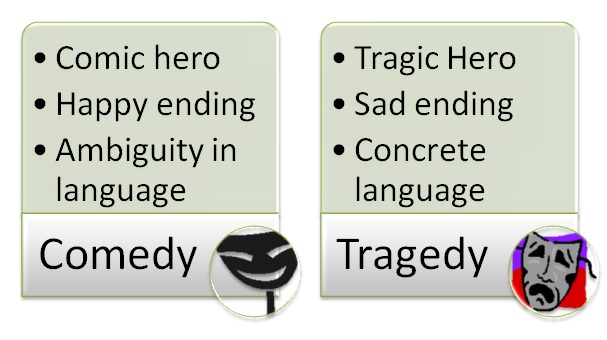Comedy vs Tragedy
If you enjoy watching plays, you might be curious about the differences between comedy and tragedy. These terms are often associated with the world’s most renowned playwright, Shakespeare. While both comedy and tragedy are genres of drama, they have distinct differences in meaning. This article will explore the differences between these two genres in terms of various aspects related to drama in literature. The primary difference between tragedy and comedy can be found in the ending of the play.
What is a Tragedy?
A tragedy is a genre of drama in literature characterized by its sad and depressing ending. The play revolves around a series of unfortunate events that occur to, or are caused by, its hero or heroine. Tragedy is also characterized by the emotions it evokes in the audience – a mix of sorrow and empathy. Although tragedy is mostly associated with plays, it can also be found in poetry and fiction. Historians believe that tragedy originated in Ancient Greece approximately 2500 years ago. Since then, it has been a prominent feature in all literary eras, with famous playwrights of tragedy including Shakespeare, Lope de Vega, Racine, and Schiller. Tragedies typically involve a series of serious actions that elicit feelings of fear and pity in the audience. The main character or protagonist of a tragedy is called a tragic hero, and the setting usually involves a battlefield, a dark and mysterious palace, or another disastrous location.
What is a Comedy?
In contrast, a comedy is a genre of drama in literature characterized by its happy and lively ending. In addition to making the audience happy, a comedy aims to provoke humor and amusement, often resulting in laughter. Comedic plays and dramas comprise the comic theatre, which has its origins in Ancient Greece. Comedies can be further subdivided into various subgenres, such as satire, burlesque, comedy of manners, and farce. The plot of a comedy typically revolves around a common problem faced by ordinary people and is usually set in a familiar location. The protagonist of a comedy is referred to as a comic hero.
What is the difference between Comedy and Tragedy?
• Tragedies have a sad and depressing ending, while comedies have a happy and lively ending.
• Tragic plots involve a series of events that happen to the protagonist, evoking fear and pity in the audience, while comedic plots often create laughter.
• The protagonist of a tragedy is called a tragic hero, while the main character of a comedy is called a comic hero.
• Comedy is often characterized by ambiguous language, while tragedy uses more concrete language.
• Tragic heroes are often stubborn, while comic heroes tend to be more willing to learn and change.
Key Takeaways
- Tragedies have sad and depressing endings, while comedies have happy and lively endings.
- Tragic plots evoke fear and pity in the audience, while comedic plots generate laughter.
- Tragic heroes tend to be stubborn, while comic heroes are more open to learning and changing.
